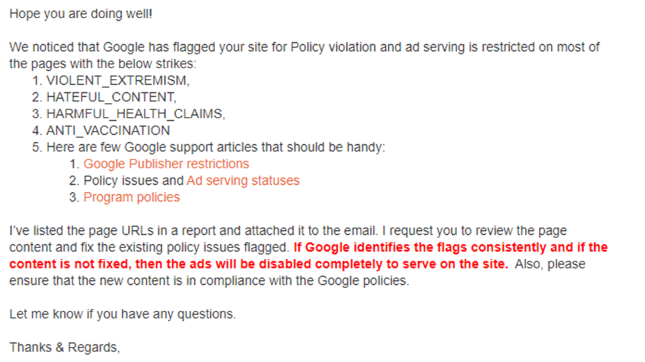Matt Taibbi long ago earned his stripes as a crusader for free speech. In his latest foray, Taibbi now cites the sad tale of Google’s censorship of Naked Capitalism, “a popular site containing economics commentary and journalism … a home for smart, independent commentary about a financial services industry that is otherwise almost exclusively covered by writers and broadcasters who’d jump at a job offer from the companies they cover.” In other words, the kind of site that exemplifies the democratic ideal of an independent press that “informs the public, holds leaders accountable, and provides a forum for debate of local and national issues.”
Naked Capitalism’s Yves Smith posted the text of what Taibbi calls an “ominous letter from its ad service company” on the journal’s website.

Today’s Weekly Devil’s Dictionary definition:
Flag:
Formerly the carefully composed symbol displayed by a group of people to signify their presence and their unity, now the badge of shame of people whose thinking and expression fails to conform to strictly defined norms.
Contextual note
Smith explains that the incriminating “URL is for a cross-post from Tom Engelhardt about Chalmers Johnson … a mild critic of US foreign policy” who “has nothing whatsoever to do with health or health care policy. That creates the appearance that Google regards ‘anti-vaxx’ as a showstopper, and is for some reason desperately applying it to this site, which is not vaccine-hostile. Google has blatantly mislabeled unrelated content to try to make that bogus charge.”
Although Fair Observer depends on donations from our readers and refuses ad revenue, we also regularly publish cross-posts from Tom Engelhardt. Undoubtedly, Google will judge that we fail to meet its recondite criteria for ad-eligibility. Because we do not solicit ad revenue, we feel safe but nevertheless compelled to denounce the abuse this represents.
Smith sees this development as particularly sinister, warning that “the Censorship Industrial Complex is now extending its tentacles into commercial relationships. This appears to be going well beyond the ‘kill a chicken to scare a monkey’ strategy of deplatforming and demonetizing particularly strident voices.”
In another article, Smith points to the fact that this is the result not necessarily of some human agent’s decision-making but of the AI algorithms Google not only uses but uncritically enforces. “We consulted several experts,” Smith explains. “All are confident that Google relied on algorithms to single out these posts. As we will explain, they also stressed that whatever Google is doing here, it is not for advertisers.”
This last point highlights how incoherent such policies can be, since this kind of censorship is detrimental not only to those who publish, but also to those who pay Google — the advertisers. Google should be aware of this fundamental economic reality: Both the publishers and the advertisers are Google’s golden geese who fill the platform’s coffers with their golden eggs of content and advertising.
As with all crimes, one must ask cui bono, who is benefitting? Even though Google keeps the advertising cash for itself when it punishes content providers for not respecting its rules, in a rational world, Google would have no longer-term interest in applying such algorithms. Why kill any of its geese that lay golden eggs? Smith, like Tiabbi, is right to detect another logic in the background: that of the Censorship Industrial Complex, an ideological as well as economic power structure.
Historical note
The economist and former Greek Finance Minister Yanis Varoufakis calls the type of economy Google, Facebook, Amazon and other platforms have now imposed on humanity “technofeudalism.” It’s a system in which power is concentrated behind the impenetrable walls of virtual castles held by a small number of unaccountable barons of the consumer economy. These lords employ an army of technologists to exploit the surrounding population and defend the castle.
Matt Taibbi describes how that army functions in the age of AI. “Technologists are in love with new AI tools, but they don’t always know how they work. Machines may be given a review task and access to data, but how the task is achieved is sometimes mysterious.” In other words, the lords make the laws, the technologists create the machinery to apply the laws, and their algorithms play the role of law enforcement.
Taibbi describes a system in which, far more effectively than in traditional feudal times, our freedom of expression is controlled. Prophet though he was in many ways, George Orwell failed to pick up the clues that were already present when he wrote 1984 thanks to rising influence of Madison Avenue. The Censorship Industrial Complex doesn’t require a highly visible central authority to command what constitutes legitimate thought.
“Companies (and governments),” Taibbi explains, “have learned that the best way to control content is by attacking revenue sources, either through NewsGuard- or GDI-style ‘nutrition’ or ‘dynamic exclusion’ lists, or advertiser boycotts.” This is the equivalent of sanctions that governments use as a substitute for war.
In the Middle Ages, the Catholic Church was the principal vector of censorship, but thanks to the emergence of universities, the church itself and its masters of theology became themselves a source of contradictory dialogue. They enthroned “disputation” as the means of discovering the truth. Satire was omnipresent in the culture of the times, in its poetry, storytelling, songs and painting. Irreverence played a noble role alongside reverence.
The church did respond to heresy, judicially and even militarily, but though some of those campaigns could be spectacular, they were few and far between. The church also exerted pressure on the aristocrats who owned the lands and raised armies. That rivalry between secular and spiritual power kept everyone on their toes and, as often as not, discouraged intellectual conformity.
That spirit of disputation prepared the intellectual terrain for writers such as Rabelais, Montaigne and Pascal in the 16th and 17th centuries. That led directly to the French Enlightenment of the 18th century which in turn spawned political revolutions in the industrializing West and implanted the belief in democracy.
The modern world battled its own heresies — fascism and communism — through two world wars and a lengthy cold war before our purely secular authorities could discover the miraculous properties of technologies that appeared to answer their dreams by providing them with effective means of homogenizing culture and all forms of intellectual ambition.
That’s where we are today. Technofeudalism combines and consolidates the secular authority of governments managed by political parties, themselves controlled by the economic elite, with the invisible but omnipresent power of the “platforms.” Thanks to the social media environment provided by the platforms, debate is possible, but it is easily marginalized, thanks to a brilliantly structured complicity between corporate media and the platforms on which everyone depends.
To the extent that marginalized independent voices manage, in spite of everything, to establish their presence, they will live in permanent fear of being demonetized and cast into cultural limbo. Governments, media and platforms work hand in hand to preserve an abstract “freedom of expression” while enforcing a system that effectively tolerates only conformist thought and expression.
Now it should be clear to everyone why, at Fair Observer, we do not advertise.
*[In the age of Oscar Wilde and Mark Twain, another American wit, the journalist Ambrose Bierce produced a series of satirical definitions of commonly used terms, throwing light on their hidden meanings in real discourse. Bierce eventually collected and published them as a book, The Devil’s Dictionary, in 1911. We have shamelessly appropriated his title in the interest of continuing his wholesome pedagogical effort to enlighten generations of readers of the news. Read more of Fair Observer Devil’s Dictionary.]
The views expressed in this article are the author’s own and do not necessarily reflect Fair Observer’s editorial policy.
Support Fair Observer
We rely on your support for our independence, diversity and quality.
For more than 10 years, Fair Observer has been free, fair and independent. No billionaire owns us, no advertisers control us. We are a reader-supported nonprofit. Unlike many other publications, we keep our content free for readers regardless of where they live or whether they can afford to pay. We have no paywalls and no ads.
In the post-truth era of fake news, echo chambers and filter bubbles, we publish a plurality of perspectives from around the world. Anyone can publish with us, but everyone goes through a rigorous editorial process. So, you get fact-checked, well-reasoned content instead of noise.
We publish 2,500+ voices from 90+ countries. We also conduct education and training programs
on subjects ranging from digital media and journalism to writing and critical thinking. This
doesn’t come cheap. Servers, editors, trainers and web developers cost
money.
Please consider supporting us on a regular basis as a recurring donor or a
sustaining member.
Will you support FO’s journalism?
We rely on your support for our independence, diversity and quality.





Comment